
Finding a job as a product engineer
Contents
Regular readers will know we're big believers in product engineers – it's literally the point of this newsletter. We define this as someone who:
- Makes and owns product decisions
- Talks to users and cares deeply about their needs
- Cares more about outcomes than shipping perfect code
- Is opinionated about what they should be building
- And can back that up with persuasive arguments
- Understands how their work impacts the business
- Tests in production and iterates with real users
- Thrives when given autonomy to engineer every element of the product
We see first hand how developers who work like this deliver amazing results. They ship faster, spark joy in customers, and have a lot of fun doing so. It's satisfying.
That's the good news.
The bad? Product engineer roles are harder to find and harder to win. You have to be cracked. You have to really want it, and you need to know where to look.
1. Choosing the right companies
This is harder than it sounds.
Typing "companies that hire product engineers" into Google doesn't work. ChatGPT has some smart suggestions, but it will only get you so far.
None of these points are universally true, but here's what we'd look for:
Founder-led companies, provided at least one of the founders is an engineer. Companies that are no longer led by their founders are less likely to maintain a strong product engineering culture.
Early and growth-stage startups. Inevitably, startups are often the first place to look if you want a product engineer-style role, though companies like GitHub and Intercom prove larger companies can be great places for product engineers too.
High engineer ratio. A company with a high ratio of engineers is more likely to give them autonomy in decision making, especially product decisions. A lower ratio doesn’t mean a company is a bad place to work, but it’s less likely to give engineers autonomy or have maker’s schedule.1
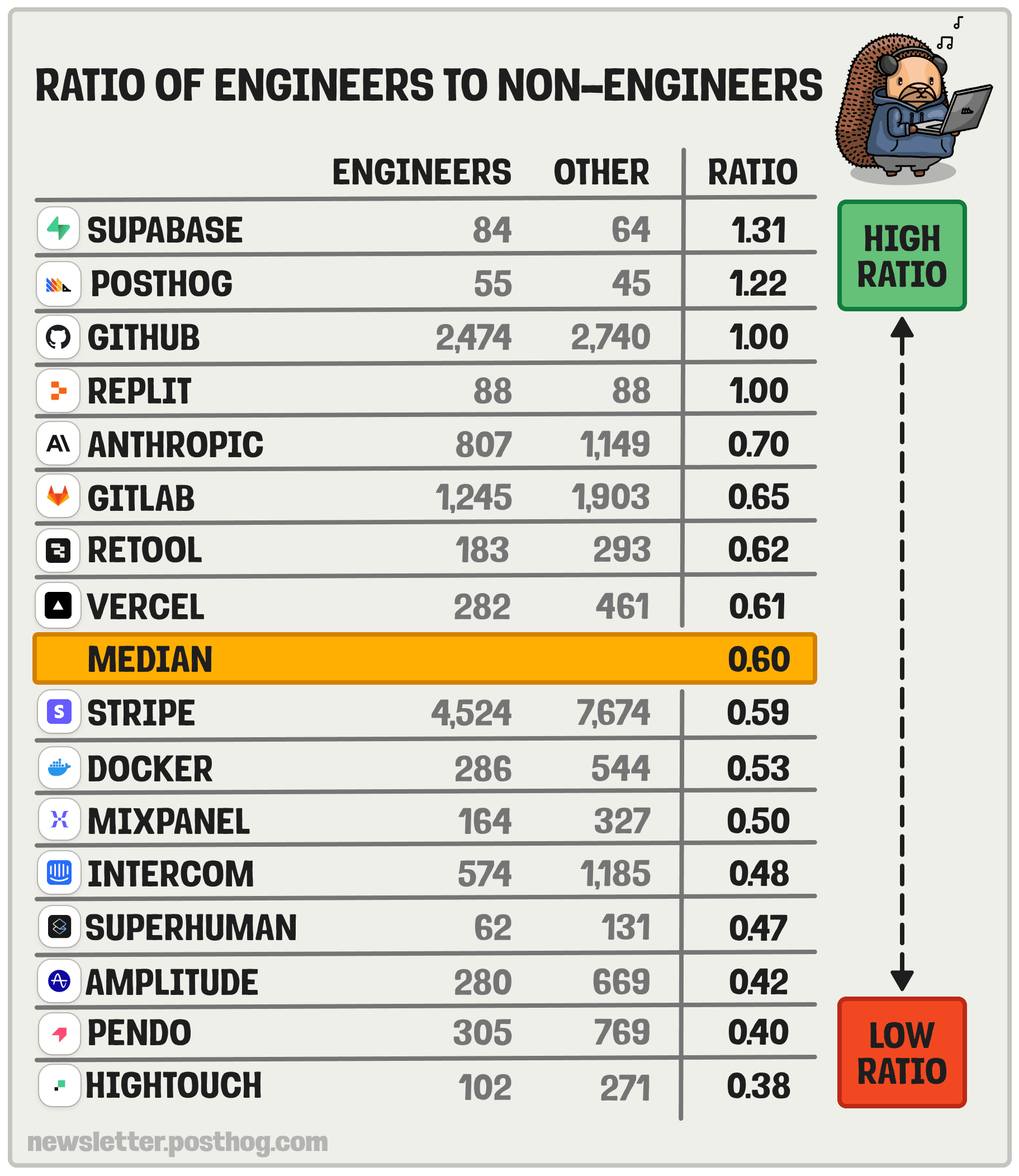
Product-led companies – i.e. companies that are self-serve with a free tier, user-centric, and where growth is driven by product usage, not enterprise sales. This is a great environment for a product engineer because they put users, not buyers, at the core of their decision-making. PostHog is a product-led company, as are companies like Supabase, Cal.com, Tailscale, Notion, and Vercel.
Bootstrapped companies can be a great place for an aspiring product engineer to develop their skills. Bootstrappers value efficiency and people who want to take ownership. Look out for bootstrapped open-source companies, especially.
Low-meeting culture. Most early-stage companies will be like this by default, but this is something you'll have to check for during interviews. Explicit meeting-free days and a preference for async communication are good signs. Dig into how decisions are made during interviews.
Red flags
No engineers as founders. A company where none of the founders are engineers is unlikely to foster a product engineer culture, and more likely to view engineering as a cost center that needs to be “optimized”.
Declining headcount. No matter the size, companies that have let go of people recently are unlikely to be healthy, and any unhealthy companies aren’t a great place for engineers seeking autonomy.
Enterprise-ey vibes. White and blue websites. No public pricing. Generic messaging. These are all signs that a company is going to be sales-led and focused on selling big contracts to slow-moving companies. Many huge companies are built this way, but they’re not a great place for product engineers.

Subscribe to our newsletter
Product for Engineers
Read by 100,000+ founders and builders
We'll share your email with Substack
2. How and where to find them
You're unlikely to find these companies and their open roles on Indeed.
The obvious place to start is Y Combinator's Work at a Startup job board – it's the largest and most well-known startup accelerator and the culture YC encourages is closely aligned with the product engineer ideal.
When searching, do the following:
- Filter Role by Engineering
- Filter Company stage by Seed, Series A, and Growth
- Tick the Show founder details option (this is important)
- (Optional) Filter by company size depending on your preferences
Now experiment with a few search parameters that communicate the values we want, such as:
- product engineer
- product-minded
- autonomy
- open source
- ownership
This will help narrow down your search to roles and companies that are looking for product engineer-style people.
As you do so, pay attention to how much detail companies add to their profiles. Most will include a basic bio of the founders, what they're building, and their tech stack; the really good ones will go into the detail about the type of company they want to build. Here's a good one from Dart, a company from YC's WW22 batch:
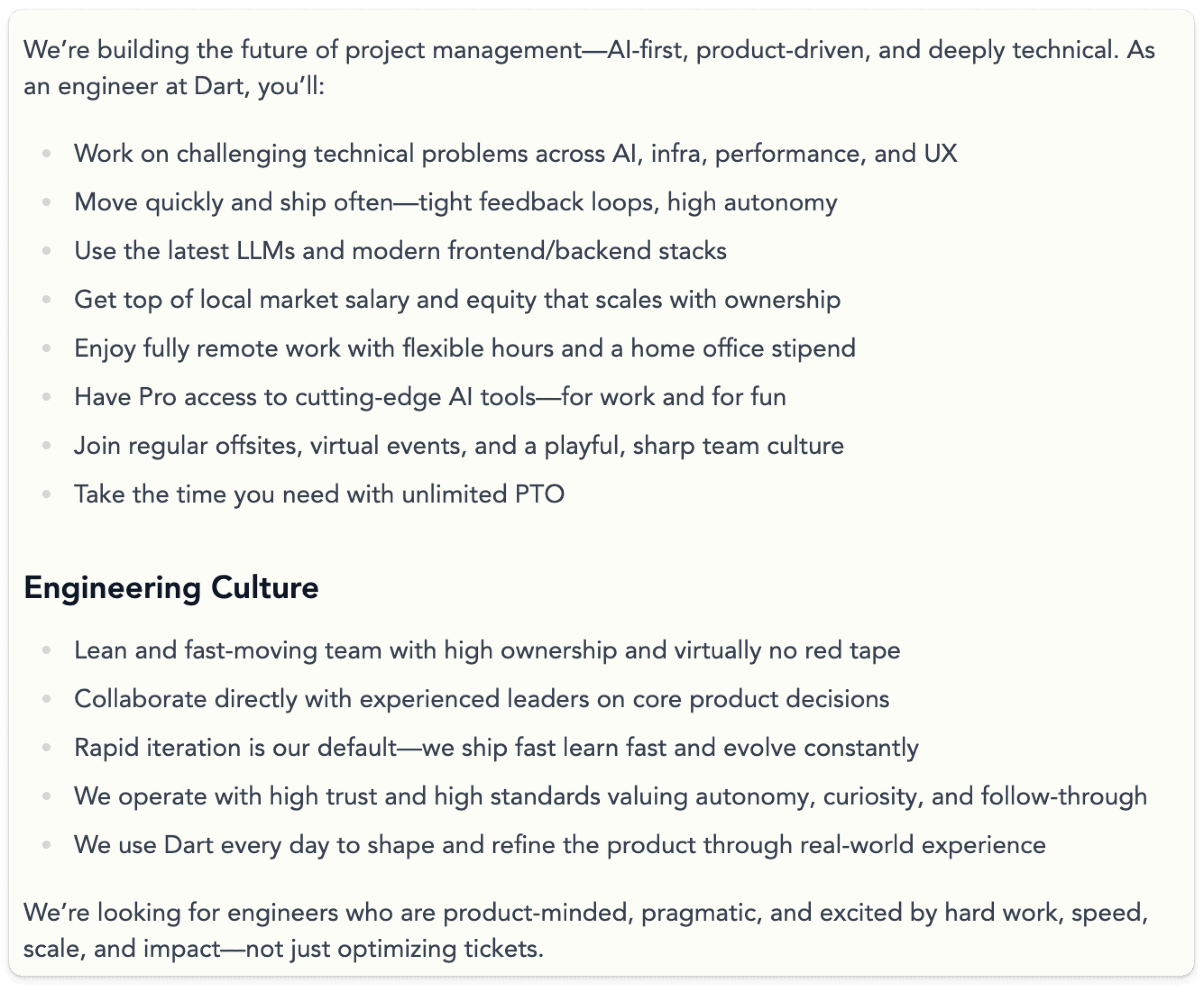
Other companies may have this kind of context on their careers website, or in their ads, but a surprising number put very little emphasis on communicating anything about their culture.
Many of these companies may be great places to work, but the odds are lower. Fostering a product engineering culture requires intent. Anyone with intent should want to tell people about it.
Other places to look
- Monthly Who's hiring? thread on Hacker News – good for engineering-led startups
- Launches on Hacker News for new companies that might be hiring
- Trending on GitHub for finding open-source startups that are gaining traction
- Brian's Job Search, which makes it easy to search ads hosted on popular application tracking systems, like Greenhouse, Lever, and Ashby
- VC job boards like Sequoia and a16z
- LinkedIn alerts using its AI search (the prompt "jobs for product-minded engineers at startups and scaleups" provides some good results)
- Our Cool Tech Jobs board, where you can filter roles by Engineers decide what to build and High engineer ratio
3. Reading between the lines
Here's the next problem:
- Product engineer isn't a universally used or understood term
- Its presence doesn't guarantee the job will be what you expect
As a result, you need to learn to read between the lines based on what companies include in their ads, and on their career pages.
Exhibit #1 is a role for a Senior Full-Stack Engineer - Product at Railway. It doesn't use the product engineer title, but its website and ads are packed with good signs.
This bullet point from the "About the role" section stands out:
"Write Engineering Requirement Documents to take something from idea, to defined tasks, to implementation, to monitoring its success."
This is a great summary of exactly what a product engineer should be doing. Owning the idea and execution, but also following through and owning its success, rather than moving onto the next ticket or task to be done.
The "About you" section backs this up and adds emphasis on the need to "lead autonomously" and work in a "mostly-asynchronous manner".
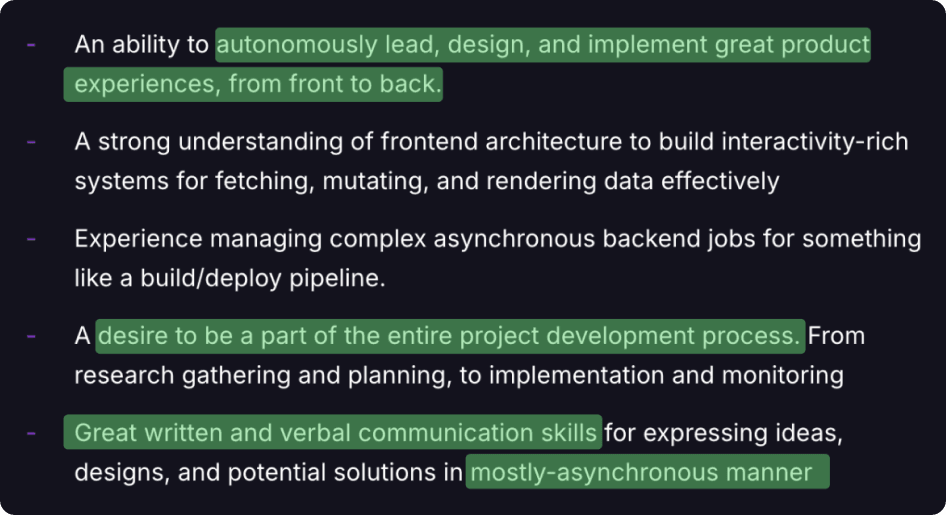
Railway has clearly thought deeply about how to communicate what it wants. Frankly, we need to up our game now, so tip-of-the-hat to the Railway folks on this one.
Incident.io also nails the key points you should look for in product engineer roles. I particularly love the focus on interacting with customers, and the need to be comfortable with ambiguity – a vital quality for any product engineer.
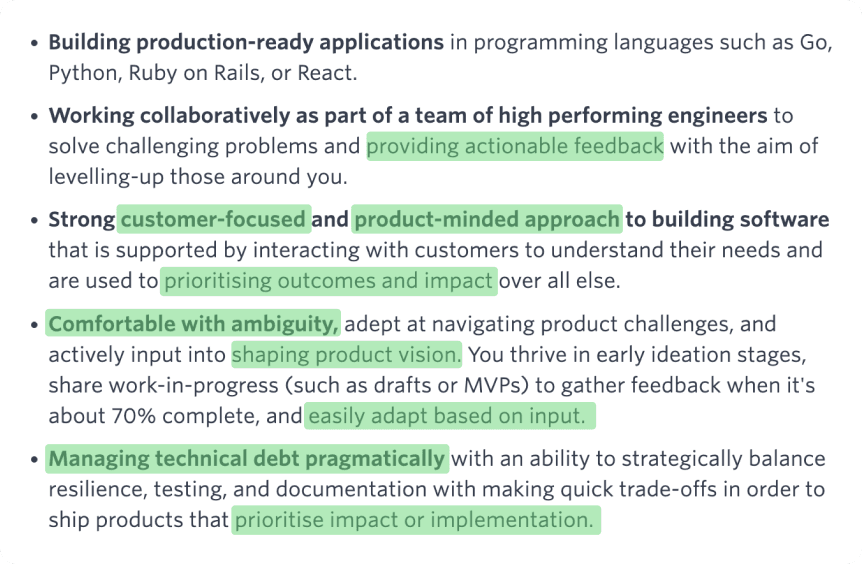
And, just to prove that it's not just early-stage startups that want product engineers, let's take a look at Intercom. Its career pages are full of good signs for anyone interested in product engineer roles.
"We ship often and make deployments fast, which keeps us on our toes" indicates a preference for shipping fast and testing in production. Intercom also places an emphasis on giving engineer agency, autonomy, and “full ownership of what we build from beginning to end."
An interesting contrast is Vercel, which advertises some roles as "product engineer", but offers few clues as to what it means on its website, or in their ads. In these situations, a little due diligence using Glassdoor (if you can tolerate the UX) and Blind can help you research the culture.
Remember, too, that culture can vary from team-to-team in larger companies, so it becomes more about asking good questions at the interview stage, like:
- "What are the company / team values, and why?"
- "Can you give me some specific ways you follow them?"
- "Who decides what to build?"
- "What does a typical work day look like?"
- "What are the things or behaviors that would cause a person in this role to fail?"
4. Increasing your odds
You need to think like a recruiter.
You may spend hours, days even, researching a company, crafting a cover letter, resumé, and so on, but even mid-sized startups get hundreds of applications.
We typically average one minute per application review, but this is just an average. Some applications can be dismissed in seconds, which gives us time to spend five to 10 minutes reading the really good ones.
Your goal is to be in the 5 to 10-minute cohort. You can increase your odds by:
a) Writing a short and obviously personalized cover letter
- 5-10 sentences on why you're interested in this role specifically is fine. No essays.
- Don't just re-write your CV.
- Don't use ChatGPT. It's really obvious.
- Figure out what the company cares about and share how you can help.
- Share what you find interesting and motivating.
Not writing a cover letter might work for bigger companies that are hiring at a huge scale, but not submitting one (especially if asked) just gives a recruiter a reason to ignore you.
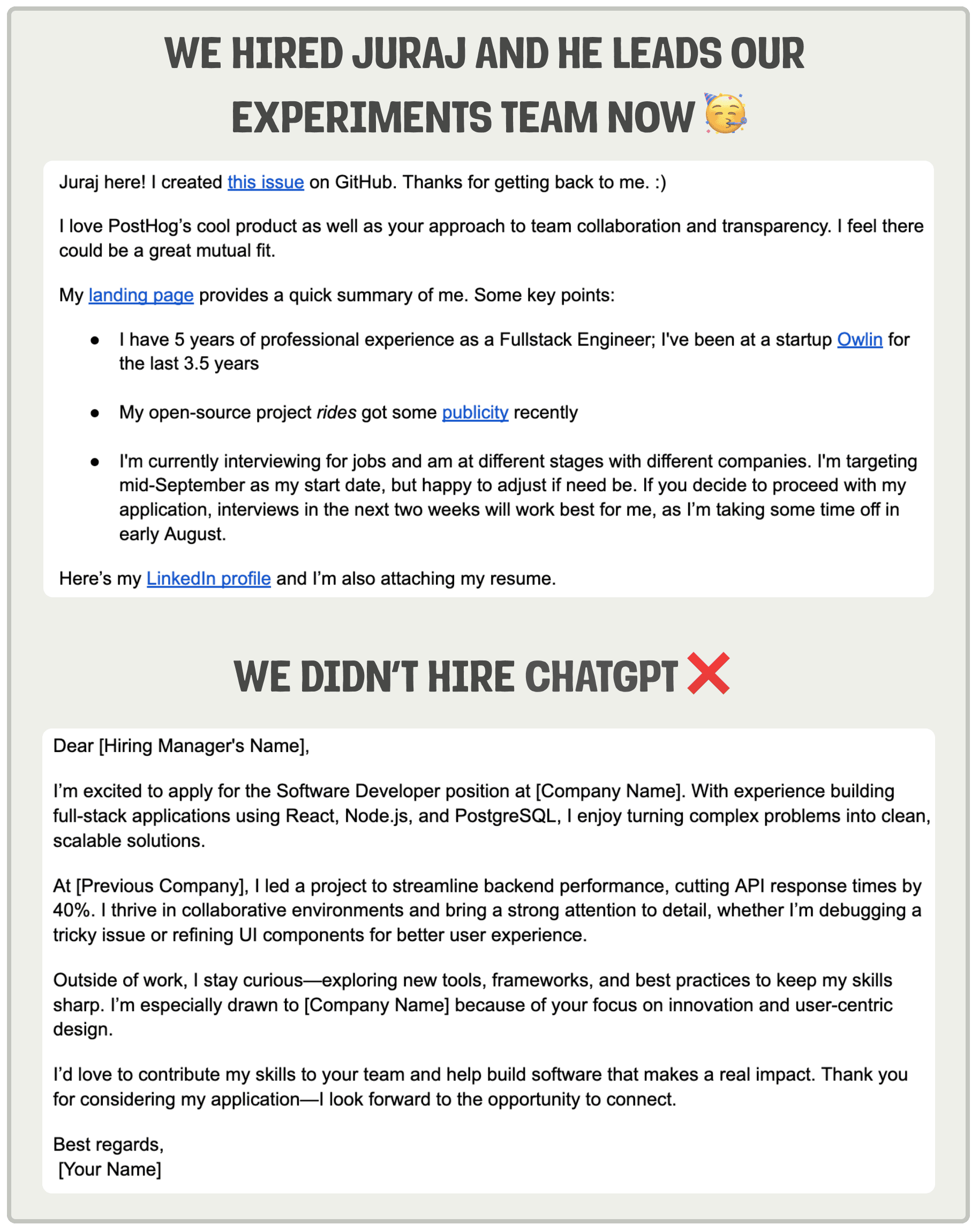
b) Keeping your resumé simple and up-to-date
- Prioritize clarity over design
- No profile pics. This isn't social media
- Keep your LinkedIn up-to-date – big discrepancies are suspicious
- If you took a career break, just say so. It's not a big deal. Unexplained gaps are suspicious.
c) Showing your product engineer credentials
Side projects are great. Building something people actually pay for is even better. This is where the real war stories come from, where you can talk about decisions you made, user interactions, and what you learned. It’s proof you can do everything needed to be a product engineer.
Write about your experiences. A personal website where you write about things you've built, lessons you learned, tools and technologies you've chosen and why, will add color to your application. You don't need to go viral on Hacker News. The habit is enough to build a narrative that gets you an interview.
Found a company! Ok, this is a stretch goal, but ex-technical founders make great product engineers. We look for them specifically.
Contribute to open source. Being a great contributor is both good for your resume, and can actually land you jobs at those companies, especially when they're early-stage companies. Fixing typos in their docs doesn't count.
Further reading
- How to get a job at a startup
- Interview questions engineers should ask (but don’t)
- What startup recruiters actually see when you apply for a job

Subscribe to our newsletter
Product for Engineers
Read by 100,000+ founders and builders
We'll share your email with Substack
- Figuring this out isn’t straightforward. If you pay for LinkedIn Premium, you can look up the spread of roles at a company via the “Insights” tab on a company’s page. This data isn’t perfect, but it is directionally useful.↩
PostHog is an all-in-one developer platform for building successful products. We provide product analytics, web analytics, session replay, error tracking, feature flags, experiments, surveys, LLM analytics, data warehouse, CDP, and an AI product assistant to help debug your code, ship features faster, and keep all your usage and customer data in one stack.









